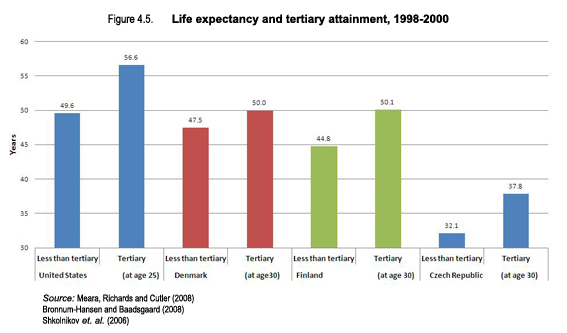Centre for Educational Research and Innovation - CERI
Improving Health and Social Cohesion through Education
Bookmark this page: www.oecd.org/edu/socialoutcomes/cohesion
Executive summary | Table of contents | How to obtain this publication
|
ISBN 962010081E1 |
Improving Health and Social Cohesion through Education Today’s global policy climate underlines the importance of better addressing non-economic dimensions of well-being and social progress such as health, social engagement, political interest and crime. Education plays an important role in shaping indicators of progress. However, we understand little about the causal effects, the causal pathways, the role of contexts and the relative impacts that different educational interventions have on social outcomes. This report addresses challenges in assessing the social outcomes of learning by providing a synthesis of the existing evidence, original data analyses and policy discussions. The report finds that education has the potential to promote health as well as civic and social engagement. Education may reduce inequalities by fostering cognitive, social and emotional skills and promoting healthy lifestyles, participatory practices and norms. These efforts are most likely to be successful when family and community environments are aligned with the efforts made in educational institutions. This calls for ensuring policy coherence across sectors and stages of education.
|
The policy climate surrounding issues of development and prosperity has gradually shifted during the last decade. There is growing interest in looking beyond the traditional economic measures of success, such as income, employment and gross domestic product (GDP), towards non-economic facets of well-being and social progress, such as health, civic engagement and happiness. Recent prominent initiatives include the French government’s Commission on the Measurement of Economic Performance and Social Progress (chaired by Joseph Stiglitz, Amartya Sen and Jean-Paul Fitoussi) and the World Health Organization’s Commission on Social Determinants of Health (chaired by Michael Marmot). These global actions have been triggered by concerns that society is not as cohesive as it should be, and that citizens are not as healthy and happy as they deserve to be. Several OECD countries have witnessed a decline in indicators of social cohesion such as voting, volunteering and interpersonal trust, changes which may well have major consequences for the quality of democratic societies. Health challenges, triggered by an increasingly high prevalence of obesity and depression, have become a major public health concern, as they lead to a significant reduction in quality of life and raise public expenditures.
- Executive summary
- Chapter 1. Introduction
- Chapter 2. The empirical framework.
- Chapter 3. Education and civic and social engagement
- Chapter 4. Education and health
- Chapter 5. Improving health through cost-effective educational interventions
- Chapter 6. Conclusion: policy messages and future agenda
- References
|
|
How to obtain this publication
Readers can access the full version of Improving Health and Social Cohesion through Education choosing from the following options:
-
Subscribers and readers at subscribing institutions can access the online edition via iLibrary.
-
Non-subscribers can purchase the PDF e-book and/or paper copy via our Online Bookshop.
-
Order from your local distributor
-
Government officials with accounts () can go to the "Books" tab on OLIS.
READ MORE
- Social Outcomes of Learning
- CERI's Activities
Related Documents

